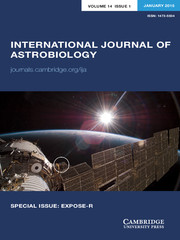Article contents
Astrobioethics: a brief discussion from the epistemological, religious and societal dimension
Published online by Cambridge University Press: 18 July 2019
Abstract
As astrobiology progresses in its quest to discover life on other planets or to put ourselves in another one, so does its moral problematic. Astrobiology is not only part of natural sciences, but also deals with direct aspects of humanities. For this reason, this paper aims to briefly examine astrobioethics from the epistemological, religious and societal dimension. It also deals with different researches in this regard, in order to better understand the state of the art on this topic and that astrobioethics can help us not only on how we should relate with extraterrestrial lifeforms, but even with terrestrials.
Information
- Type
- Research Article
- Information
- Copyright
- Copyright © Cambridge University Press 2019
Footnotes
Professor at the Universidad de Lima. President and founder of the Peruvian Association of Astrobiology (ASPAST). Associate Member of the International Astronomical Union F3 Commission, and International Working Group on Astrobioethics of the International Association on Geoethics.
References
- 9
- Cited by

